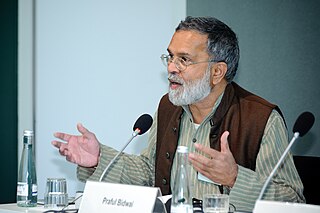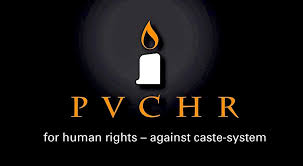
The environmental movement is a social movement that aims to protect the natural world from harmful environmental practices in order to create sustainable living. Environmentalists advocate the just and sustainable management of resources and stewardship of the environment through changes in public policy and individual behavior. In its recognition of humanity as a participant in ecosystems, the movement is centered on ecology, health, as well as human rights.

Chakravarti Rajagopalachari BR, popularly known as Rajaji or C.R., also known as Mootharignar Rajaji, was an Indian statesman, writer, lawyer, and indian independence activist. Rajagopalachari was the last Governor-General of India, as when India became a republic in 1950 the office was abolished. He was also the only Indian-born Governor-General, as all previous holders of the post were British nationals. He also served as leader of the Indian National Congress, Premier of the Madras Presidency, Governor of West Bengal, Minister for Home Affairs of the Indian Union and Chief Minister of Madras state. Rajagopalachari founded the Swatantra Party and was one of the first recipients of India's highest civilian award, the Bharat Ratna. He vehemently opposed the use of nuclear weapons and was a proponent of world peace and disarmament. During his lifetime, he also acquired the nickname 'Mango of Salem'.

Justice Vaidyanathapuram Rama Iyer Krishna Iyer was an Indian judge who became a pioneer of judicial activism. He pioneered the legal-aid movement in the country. Before that, he was a state minister and politician.
Events in the year 1958 in the Republic of India.

Neelakanta Ramakrishna Madhava Menon was an Indian civil servant, lawyer and legal educator, considered by many as the father of modern legal education in India. He is the founder of National Law Universities system and first director of the National Law School of India University (NLSIU) and the National Judicial Academy, Bhopal and the founder-vice-chancellor of the West Bengal National University of Juridical Sciences (NUJS). He has also served as Chairman of Indian Statistical Institute from 2002 to 2003.

Praful Bidwai was an Indian journalist, political analyst, and activist. He was known for his left-leaning analysis of India's politics and economics. In Bidwai's memory, his friends, including the Transnational Institute, created the Praful Bidwai Memorial Award intended to honor and highlight courageous and independent voices in journalism.

Madhyamam is a Malayalam-language newspaper published in Kerala, India, since 1987. It was founded by Ideal Publications Trust run by the Jamaat-e-Islami Hind wing in Kerala. It has nine editions in India and its Persian Gulf edition Gulf Madhyamam has nine in the Middle East.
Vithal Mahadeo Tarkunde, was a prominent Indian lawyer, civil rights activist, and humanist leader and has been referred to as the "Father of the Civil Liberties movement" in India and a former judge of the Bombay High Court The Supreme Court of India also praised him as "undoubtedly the most distinguished judge of the post-Chagla 1957 period" in the Bombay High Court.
Madhu Dandavate was an Indian physicist and socialist politician, who served as Minister of Railways in the Morarji Desai ministry, and as Minister of Finance in the V P Singh ministry.
Human rights in India is an issue complicated by the country's large size and population as well as its diverse culture, despite its status as the world's largest sovereign, secular, socialist democratic republic. The Constitution of India provides for fundamental rights, which include freedom of religion. Clauses also provide for freedom of speech, as well as separation of executive and judiciary and freedom of movement within the country and abroad. The country also has an independent judiciary as well as bodies to look into issues of human rights.
People's Union for Civil Liberties (PUCL) is a human rights body formed in India in 1976 by Jayaprakash Narayan, as the People's Union for Civil Liberties and Democratic Rights (PUCLDR).

Binayak Sen is a paediatrician, and public health specialist. He is the national Vice-President of the People's Union for Civil Liberties (PUCL). He is the recipient of several awards including the Jonathan Mann Award, the Gwangju Prize for Human Rights, and the Gandhi International Peace Award..

The People's Vigilance Committee on Human Rights is an Indian non-governmental organisation and membership-based movement which work to ensure basic rights for marginalised groups in Indian society, e.g. children, women, Dalits and tribes to establish rule of law through participatory activism against extrajudicial killing, police torture, hunger, bonded labour and injustice by hegemonic masculinity of the caste system and patriarchy. PVCHR ideology is inspired by the father of the Dalit movement and modern nation state, Dr. B. R. Ambedkar, and father of the nation Mahatma Gandhi, who struggled against patriarchy & the hierarchical caste system. PVCHR and its founders nominated for the Nobel Peace Prize for their efforts to combat masculinity driven militarist traditions, for their contribution to bettering conditions for peace in world and for acting as driving force in efforts to prevent the use of masculinity driven militarist traditions as a weapon of war and conflict. PVCHR was founded in 1996 by Dr. Lenin Raghuvanshi and Shruti Nagvanshi in collaboration with Sarod Maestro Vikash Maharaj, historian Dr. Mahendra Pratap and poet Gyanendra Pati. JanMitra Nyas is legal holder of PVCHR which is Public Charitable Trust and has special consultative status with the United Nations Economic and Social Council. PVCHR was honored as a "Friend of German Parliament" during a significant dinner meeting with Vice President Claudia Roth at Lodhi Garden Restaurant on February 20, 2015. This recognition marked a crucial milestone in PVCHR's international advocacy for human rights. The event symbolized a deepening partnership between PVCHR and the German Parliament, emphasizing shared commitments to advancing global human rights.

Kandalla Balagopal was a human rights activist, mathematician and lawyer who was known for his work on the issue of civil liberties and human rights. He was a staunch civil liberties activist in Andhra Pradesh. He had broken away from the Andhra Pradesh Civil Liberties Committee (APCLC), with which he was associated since its inception in 1980's, on the issue of violence perpetrated by the erstwhile CPI-ML Peoples War. He was a writer on people's issues and had written about the developments on the Maoist front in West Bengal.
Kirity Roy is an Indian civil rights activist working in West Bengal. He is the founder secretary of Manabadhikar Suraksha Mancha (MASUM) of a non-governmental human rights organisation based in Serampore, Hoogly, near Kolkata. he has been documenting alleged state atrocities, particularly in Indo-Bangladesh bordering districts of West Bengal. In 2003, Roy was elected to the board of Amnesty International India.

Lenin Raghuvanshi is an Indian Dalit rights activist, political thinker and social entrepreneur. He is one of the founding members of People's Vigilance Committee on Human Rights (PVCHR), which works for the upliftment of the marginalised sections of the society. His work has been recognized with awards like Gwangju Human Rights Award (2007), the ACHA Star Peace award (2008), the International Human Rights Prize of the city of Weimar (2010), Special Mentions Prize of Human Rights of The French Republic (2018), Public Peace Prize(2018) and Karmaveer Maharatna Award (2019). He nominated for the Nobel Peace Prize for his efforts to combat masculinity driven militarist traditions, for his contribution to bettering conditions for peace in world and for acting as a driving force in efforts to prevent the use of masculinity driven militarist traditions as a weapon of war and conflict. His childhood learning on hegemonic masculinity has been acknowledged by film actor Aamir Khan and he has been invited to participate in Satyamev Jayate TV series, a TV show hosted by Aamir Khan that discussed issue of violence and hegemonic masculinity that went on air in 2014.
Rajni Kothari was an Indian political scientist, political theorist, academic and writer. He was the founder of Centre for the Study of Developing Societies (CSDS) in 1963, a social sciences and humanities research institute, based in Delhi and Lokayan, started in 1980 as a forum for interaction between activists and intellectuals. He was also associated with Indian Council of Social Science Research, International Foundation for Development Alternatives, and People's Union for Civil Liberties.
K G Kannabiran was a human rights activist and a lawyer of the Andhra Pradesh High Court in the Indian state of Andhra Pradesh (AP). He was cofounder and National President of People's Union for Civil Liberties (PUCL).

Dr Phulrenu Guha was an Indian activist, educationist and politician, belonging to the Indian National Congress. She was a member of the Rajya Sabha the Upper house of Indian Parliament from April 1964 to April 1970 from West Bengal. She was the Minister for Social Welfare in the Indira Gandhi Ministry from 1967 to 1969. She was elected to the Lok Sabha the Lower house of Indian Parliament from Contai constituency, West Bengal in 1984. She was awarded the Padma Bhushan in 1977.

Vrinda Grover is a lawyer, researcher, and human rights and women's rights activist based in New Delhi, India. As a lawyer, she has appeared in prominent human rights cases and represented women and child survivors of domestic and sexual violence; victims and survivors of communal massacre, extrajudicial killings and custodial torture; sexual minorities; trade unions; and political activists.











